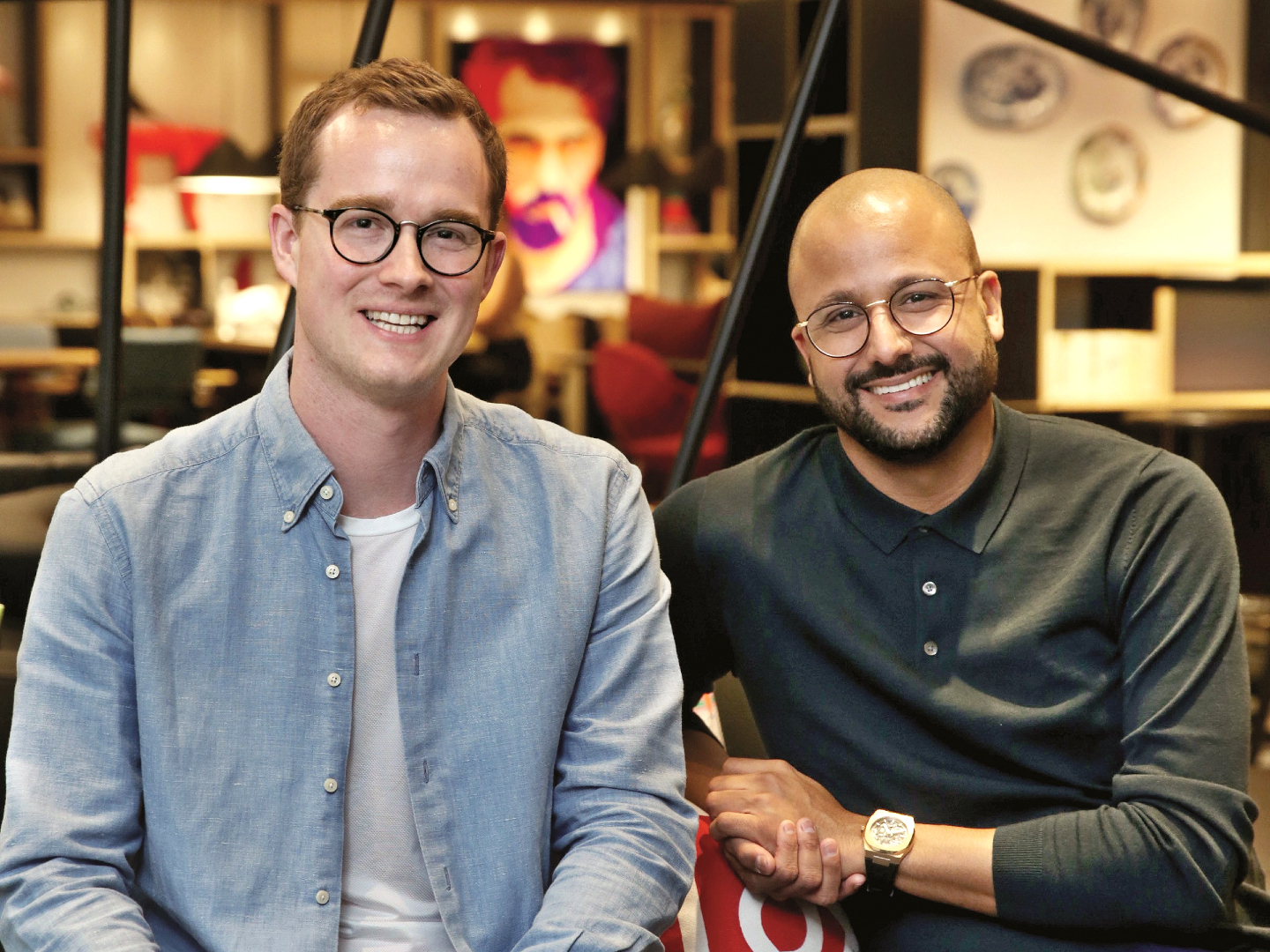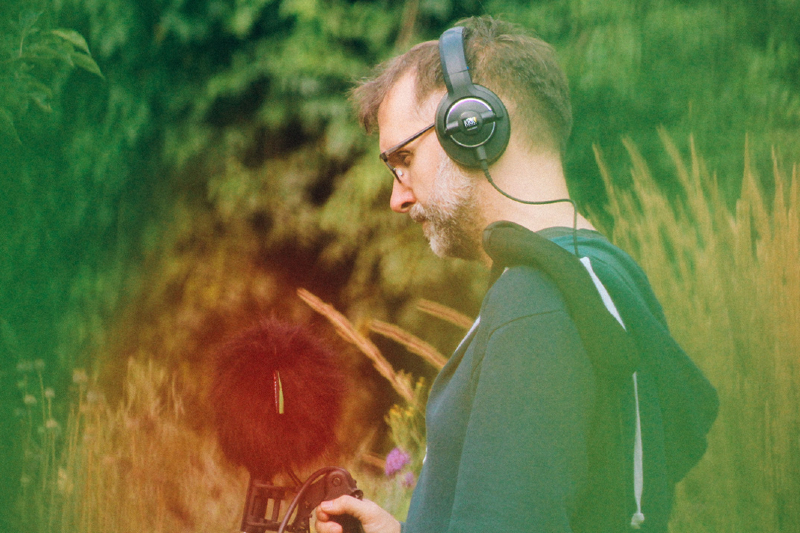
Humphrey (left) and Ajanaku see music, among other elements, being used more to help travellers in transit (Photo: Sam Fong/The Edge)
There is a science behind how music helps people feel a certain way and why it elicits different responses from them. But few people engage with music to help them get to a particular point, much like with medicine, for example. “I think Music for Brainwaves is potentially the start of a movement in that direction,” says Ollie Humphrey, managing director of London-based audio branding agency Soundscape.
Brainwaves, a three-track album, uses reference tones, pitches and notes that scientists felt would have the most beneficial effect on listeners to address anxiety, focus and sleep. Composers Högni, Michael Price and Ben Lukas Boysen were asked to create a track each to help business travellers who want to feel less anxious (about flying, for example), concentrate (putting their game face on) or sleep get to that state quicker.
“The three states have different frequencies and oscillations. What we did was embed the tracks with amazing pieces of music that emulate the frequencies to [evoke] an emotional response. It’s a bit of magic in a way,” says Humphrey, who visited Malaysia in November for the launch of Brainwaves at citizenM Kuala Lumpur. A lot of people have been interested in the wellness space of music but they action that science poorly, he adds. They use artificial intelligence-generated algorithms to create whatever the science tells them to do and the music ends up sounding very plastic.
banner.jpg

“At the end of the day, music has to be enjoyed. It has to be beautiful and engaging, otherwise you switch it off.
“This is the first time we’ve partnered award-winning artistes to interpret the scientific brief and put their own creative spin on it. Brainwaves is the result of two different worlds — science and creativity — colliding, which does not happen often.”
The merging of technology and culture saw UK record label Erased Tapes working with music scientists at Goldsmiths, University of London, with the support of Bose, the US manufacturer known for its home audio systems and speakers.
Marketing director of citizenM Hotels Maurice Ajanaku says its KL property is the first under the Netherlands-based chain to install Brainwaves — Vol One of its Guide to Business Travel — in all of its 210 rooms. The new music experience addresses common issues faced by modern travellers in transit, taking the brand commitment of seeing to guests’ needs through the concept and design of its hotels — the first of which opened in Amsterdam in 2008 — to the next level.
“It’s one of the most collaborative projects we’ve done in citizenM,” Ajanaku says. “We’re making sure it is not seen as a gimmick because there is that science, that reasoning behind it. It is really more of a tool we have created and we want people to be aware it is available to help them during their travels.”
citizenmkl.jpg

Having Bose as a partner kind of gives Brainwaves “the seal of approval because the brand is really also about technology and science in their products and has the same kind of audience we are talking to”, he adds.
The 20-minute tracks are freely available to anyone who has a digital device, anywhere, and Humphrey estimates that as at November, about half a million people had listened to them. The music can be used in any stressful environment, not specifically while travelling. A large focus group was involved in rigorous, independent tests to show how Brainwaves’ pieces performed versus silence and typical relaxing meditative music. “The results were fascinating,” he says.
Compared with silence, Brainwaves was 40% more effective at helping someone retain focus over a 20-minute period, and beyond that. However, silence was more effective than standard relaxing music if he was trying to calm down. The anxiety results showed the tracks were five times more effective in getting someone back down to his base heart rate than silence and relaxing music.
Keep the volume somewhere in the middle, he suggests, because the zone-out experience — as opposed to a vocal track that leads the listener to zone in — works on a meditative subconscious level.
“If you’re reading a book and really enjoying it, you don’t need the music. But if you’re trying to get through 100 emails in half an hour and you want to concentrate solely on that one thing, having the focus track in the background will help sustain your attention.”
Each track is a continuous piece of music, repetitive and syncopated, that works on the brain patterns to elicit a particular response, he explains. “Sometimes, you hear the frequencies I’m talking about; sometimes you may not. They dip in and out.
“The thing about music in the wellness space is you don’t want to distract the listener too much. It needs to be very rhythmic, steady
and progressive, which makes for a better listening experience. If you have lots of new elements coming in and out, it creates a distracting environment that deters from what we’re trying to achieve.”
Humphrey founded Soundscape Agency in January 2016 and uses music, “the most emotive form of communication”, to excite people and break down barriers across different cultures, whether it is curating a playlist for a retail chain across Europe and the US, or creating a bespoke composition for a luxury car advertisement.
His role in the Brainwaves collaboration is to “kind of make sure the top-tier stuff happens properly. I worked with the brand to come up with this idea and figure out how to make it relevant for the business traveller today, bringing in the scientists and musicians. I also worked with citizenM, making sure Bose is a relevant partner in the project, while Maurice and his team execute it and tell the story to the outside world in a way that connects to what we are doing.”
michael_price.jpg

Are there new tracks in the pipeline?
“Vol One is a project that will always exist and which we will always build on,” Humphrey says. “The tracks don’t have a lifespan. They can be listened to for as long as people are interested, as long as they can help people.
“I think Brainwaves will be part of the new movement on how people consume music. It could tie in with other elements, like food and sounds, and be linked to how our taste buds work.”
Plans to embed it in other citizenM properties are happening already, Ajanaku adds. “But we will work with other partners to develop elements and tools that help with travel — maybe a techno brand on lighting. Guide to Business Travel is not only about the audio. There are a lot of broader things and this is just one of those parts.”
In a video on Brainwaves, Price, who won an Emmy Award with David Arnold for the music for BBC TV series Sherlock and was music editor of Peter Jackson’s The Lord of the Rings trilogy, talks about music and focus.
“Our attention is so scattered because of the social media we use and the busyness of our lives. What I experienced listening to the track was the sense of my attention being more rested on the same thought. .. I think the ability to frame a moment in time, 20 minutes of your time to write something yourself, to read, to produce something. .. it’s a gift I would like to give people.”
Listen to 'Music for Brainwaves' here.
This article first appeared on Jan 6, 2019 in The Edge Malaysia.


